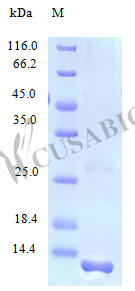The Recombinant Human CCL28 protein is a critical research tool for scientists working in the field of immunology. This C-C motif chemokine 28, also known as CCL28 and SCYA28, is produced in E. coli and covers the 20-127aa expression region of the full-length mature protein. The tag-free protein is provided in lyophilized powder form, allowing for effortless reconstitution with sterile water or buffer to suit a wide range of experimental conditions.
We are committed to delivering high-quality products, and our Recombinant Human CCL28 protein showcases a purity of >97% as determined by SDS-PAGE and HPLC analysis. Moreover, endotoxin levels are maintained below 1.0 EU/µg, as measured by the LAL method. The protein exhibits full biological activity in a chemotaxis bioassay using human lymphocytes, with an effective concentration range of 1.0-10.0 ng/ml.
The role of CCL28 in immune regulation has been investigated in several studies. For instance, Hieshima et al. (2003)[1] first described CCL28 as a chemokine that binds CCR10 and recruits IgA-producing plasma cells to mucosal tissues. Later, Pan et al. (2006)[2] reported the involvement of CCL28 in the pathogenesis of inflammatory bowel disease. More recently, Meijerink et al. (2018)[3] highlighted the potential of CCL28 as a therapeutic target for colorectal cancer. These studies emphasize the importance of CCL28 in the immune system and its potential as a therapeutic target for immune-related diseases.
References:
1. Hieshima K, et al. CCL28 has dual roles in mucosal immunity as a chemokine with broad-spectrum antimicrobial activity. J Immunol. 2003;170(3): 1452-61.
2. Pan J, et al. A novel chemokine ligand for CCR10 and CCR3 expressed by epithelial cells in mucosal tissues. J Immunol. 2000;165(6): 2943-9.
3. Meijerink M, et al. The chemokine CCL28 and its receptor CCR10: A promising therapeutic target in colorectal cancer. J Pathol. 2018;244(4): 393-404.






